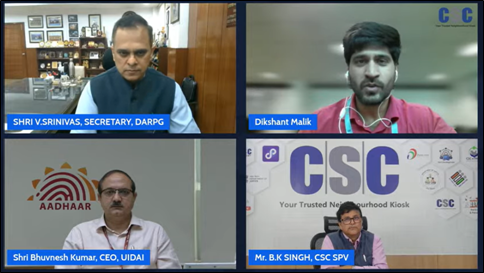DARPG, UIDAI, and CSC Collaborate to Boost Aadhaar Grievance Redressal via CPGRAMS
DARPG Secretary Shri V. Srinivas presented data insights from Aadhaar-related grievances lodged in 2025 via CPGRAMS, specifically those routed through the CSC network.

- Country:
- India
In a robust push to advance citizen-centric e-governance, the Department of Administrative Reforms and Public Grievances (DARPG), in partnership with the Common Services Centres (CSC), held a nationwide live virtual session with the Unique Identification Authority of India (UIDAI) and CSC Village Level Entrepreneurs (VLEs). The objective: to directly address Aadhaar-related grievances registered on the Centralized Public Grievance Redress and Monitoring System (CPGRAMS) and to strengthen the last-mile grievance redressal mechanism.
Held in line with the Hon’ble Prime Minister Narendra Modi’s vision of a more accessible, responsive, and citizen-friendly governance ecosystem, the session brought together key administrative leaders and grassroots functionaries to bridge policy with practice.
Top Officials Convene for Grievance Redressal Deep Dive
The session was chaired by:
-
Shri V. Srinivas, Secretary, DARPG
-
Shri Bhuvnesh Kumar, CEO, UIDAI
-
Shri B.K. Singh, Group President, CSC e-Governance Services India Ltd.
Their participation highlighted the government’s inter-departmental commitment to streamlining Aadhaar grievance redressal, especially in rural and semi-urban regions where access to digital services often lags.
Focus on Field Feedback and Real-Time Problem Solving
More than just a policy showcase, the session was action-oriented, featuring interactive discussions with VLEs from Varanasi (Uttar Pradesh), Dehradun (Uttarakhand), and several districts in West Bengal. These local entrepreneurs, who operate CSCs in their respective areas, act as digital service ambassadors—helping citizens navigate the often complex processes of Aadhaar registration, updates, and authentication.
Their feedback provided a ground-level view of recurring issues, including:
-
Delays in Aadhaar demographic or biometric updates
-
Authentication errors in welfare scheme enrolments
-
Challenges faced by the elderly and migrant workers in accessing Aadhaar services
-
Lack of awareness about digital grievance registration through CPGRAMS
This two-way dialogue helped senior officials better understand operational challenges and identify avenues for service improvement, training, and infrastructure enhancement.
Analysis of Aadhaar Grievance Trends in 2025
DARPG Secretary Shri V. Srinivas presented data insights from Aadhaar-related grievances lodged in 2025 via CPGRAMS, specifically those routed through the CSC network. His analysis revealed key areas of citizen concern and emphasized the growing role of VLEs as frontline grievance facilitators.
“The CPGRAMS platform is now far more responsive, but its effectiveness depends on last-mile delivery through empowered VLEs. We aim to boost their capacity and digital literacy to ensure that no citizen is left behind,” said Shri Srinivas.
CSCs as the Cornerstone of Digital Public Service Delivery
Speaking on behalf of the CSC ecosystem, Shri B.K. Singh outlined the transformative role of VLEs in ensuring that even the remotest corners of the country have access to grievance redressal mechanisms. He highlighted how over 5 lakh CSCs now function as digital public utility nodes, helping citizens access not just Aadhaar services but also passport applications, e-health consultations, banking services, and skill development programs.
The session also featured VLE success stories, showcasing examples where prompt action through CPGRAMS led to re-issuance of Aadhaar cards, resolution of data mismatches, and enrollment of elderly or physically challenged citizens who were previously excluded.
UIDAI Commits to Simplifying Processes and Enhancing Integration
Shri Bhuvnesh Kumar, CEO of UIDAI, acknowledged the three key Aadhaar grievance categories:
-
Application Delays and Rejections
-
Update and Correction Errors
-
Authentication Failures for Scheme Eligibility
He stressed the importance of real-time grievance monitoring, platform integration, and automated feedback loops between UIDAI, CPGRAMS, and CSCs to address these issues. He also proposed introducing capacity-building programs for VLEs to ensure they are well-versed in new Aadhaar policy updates and user interface changes.
CPGRAMS and CSCs: Synergizing Citizen Engagement
Launched as a flagship grievance redressal portal, CPGRAMS has evolved to integrate with digital service delivery channels like CSCs, making it more inclusive and geographically accessible. By empowering VLEs to act as navigators and grievance submission agents, the government is making administrative systems more approachable and outcome-driven.
“This is how we take governance from boardrooms to the grassroots. By enabling our VLEs, we are giving voice to the citizen,” said an official from DARPG.
Key Takeaways and Road Ahead
The live session concluded with a series of forward-looking commitments:
-
Onboarding more VLEs onto grievance redressal awareness programs
-
Custom training modules for Aadhaar grievance handling
-
Improved digital tools and SOPs for real-time grievance tracking
-
Pilot programs in high-volume districts to test integrated service models
-
Regular virtual forums for VLE feedback
As India moves toward a more digitally empowered and accountable public service framework, initiatives like these demonstrate how technology, training, and institutional synergy can come together to make governance truly “citizen-first.”
Citizen-Centric Governance in Action
The collaborative session between DARPG, UIDAI, and CSC reflects a strong institutional commitment to inclusive governance. By strengthening the digital infrastructure for grievance redressal and engaging VLEs as field agents of trust and access, the government is building a responsive ecosystem where every citizen’s voice matters—whether from the urban metros or rural heartlands.










